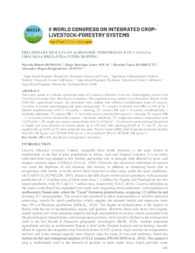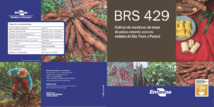Publications
Preliminary results on agronomic performance of cassava-urochloa brizantha intercropping.
Author(s): ROMANO, M. R.; SOUSA, D. H. L.; HASHIGUTI, H. T.; BRIGHENTI, A. M.
Summary: This study aimed to evaluate agronomic traits of a cassava (Manihot esculenta) intercropping system with Urochloa brizantha (Syn. Brachiaria brizantha). The experiment was carried out at Paranavaí, Brazil, in the 2020-2021 agricultural season. Six treatments were studied with different establishment times of cassavaUrochloa brizantha intercropping and grass management: T1: cassava in double rows-DR (13,888 pl ha-1) planted simultaneously with U. brizantha + mowing; T2: cassava DR and U. brizantha simultaneously + herbicide underdose; T3: cassava DR + U. brizantha sown 6 months after cassava + mowing; T4: cassava DR + U. brizantha sown 6 months after cassava + herbicide underdose; T5: single-row cassava monoculture with 13,520 pl ha-1; T6: single row cassava monoculture with 18,168 pl ha-1. Urochloa brizantha reduced the growth in height and stem diameter of cassava plants up to 180 days after planting (DAP) in T1 and T2, but not significantly (p <0.05) in T2 when herbicide was used. The dry matter (DM) yield of pasture increased monthly from 90 (356 kg ha-1) to 150 DAP (950 kg ha-1), but it reduced 50% at 180 DAP (406 kg ha-1).
Publication year: 2021
Types of publication: Abstract in annals or event proceedings
Unit: Embrapa Cassava & Fruits


